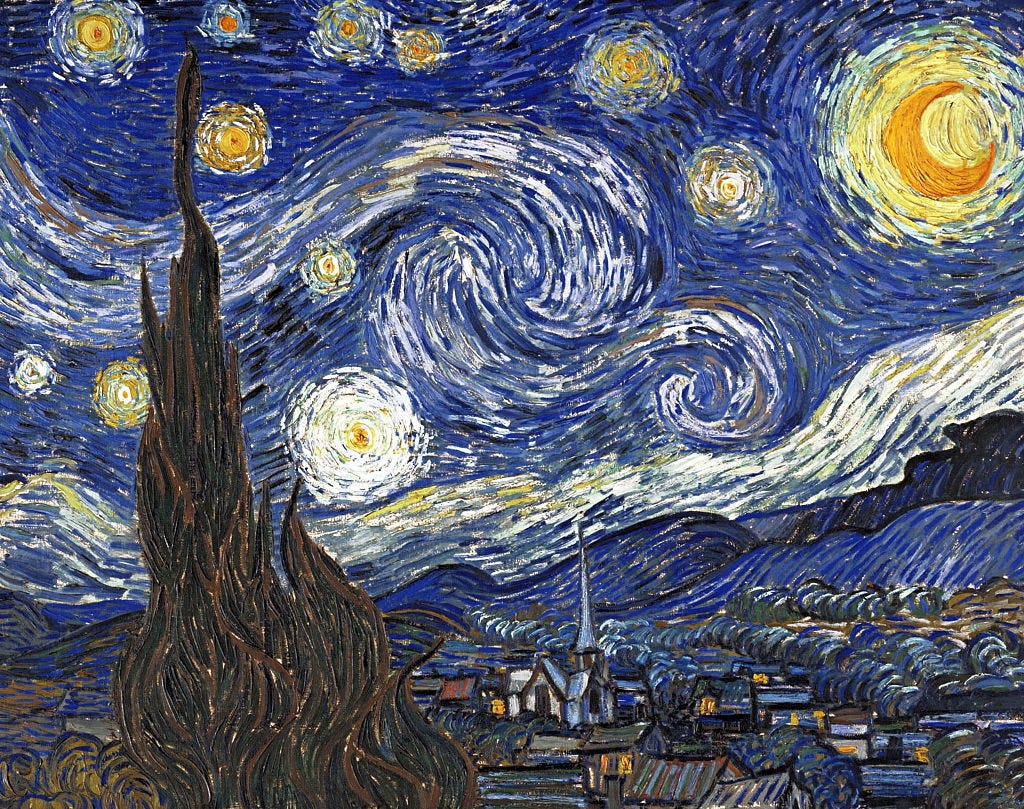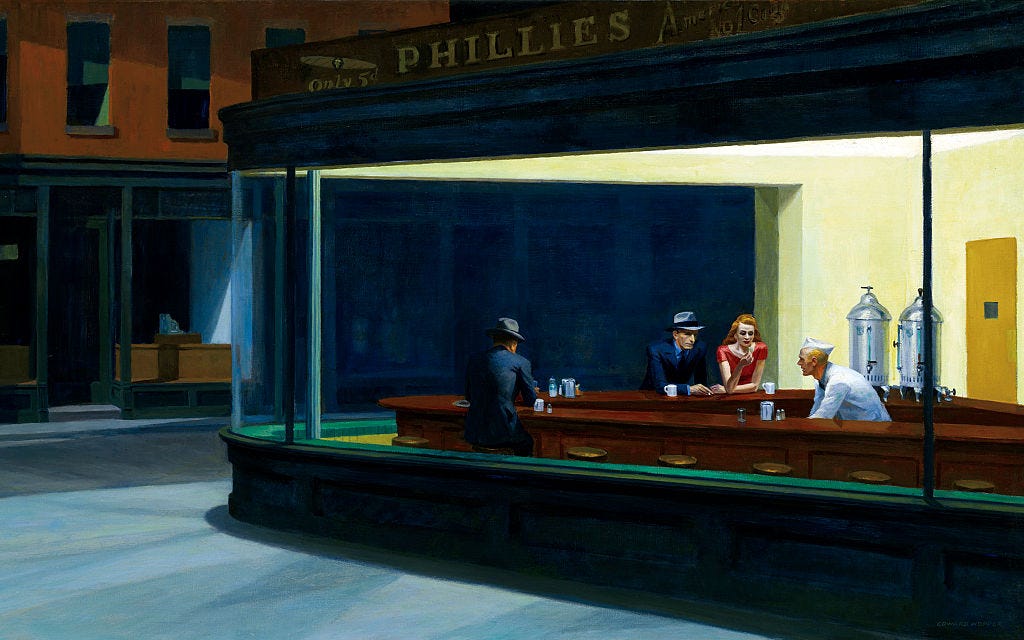The Night Watch.
‘In a real dark night of the soul, it is always three o'clock in the morning.’ That was F. Scott Fitzgerald, in words I think about at 3 am.
Vincent van Gogh couldn’t sleep. Here is one of the things he did instead: The Starry Night, now at MOMA in New York. (Getty Images.)
This post is on a different theme from the normal politics, media, local-renewal, and aviation fare, to which we’ll return. It’s for me an atypically personal chronicle.
The world is divided into two kinds of people. Those who think there are two kinds of people, and …
That’s an old joke, but one relevant to my point right now. There are lots of useful “two kinds” divisions of humanity. Cat people, and dog people. Beer people, and wine people. Morning people, and night people. I could go on.
For the moment my division is between those who like sharing what is happening to them, and those who don’t. I am strongly in the latter camp. When my siblings and I were growing up, we internalized the “shake it off!” mentality of our widely beloved father, a small-town MD. We learned the mocking term “organ recital” for elderly relatives going through their list of ailments. No physical condition got better through your complaining about it.
As a 10-year-old I once broke my ankle in a playground accident—and it was only after several days of swelling that my dad started to think it was a “real” disorder that deserved X-rays, followed by six weeks in a cast.
But eight years ago, I made an exception in writing about the disease that—unbeknownst to me—had almost killed me. That was a parathyroid disorder: Not the much better-known thyroid problems many people have, but something entirely different and more dangerous. It’s what the comedian Gary Shandling died of, which was the occasion for my writing about it at the time. After Shandling’s demise I shared my experience of having had the same disease, and ignoring it, and eventually having it resolved through complicated 5-hour surgery at UCSF—and what other people might learn from what I’d been through. As it happened, I eventually heard from many thousands of people who’d had the same problem—or belatedly learned that they did.
In that spirit, I mention that in the two-plus years since my initial bout of Covid, my life has been dominated by the fact that I cannot sleep. I’ve never been a “good sleeper.” But this is different.
I clearly remember, at age 14, getting up at 3:30 am to prowl around the house and finding my father, also still awake, working his way through a “Teach Yourself Hebrew!” book that was part of his never-ending self-education process. One of the reasons I chose writing as a career is the working hours: Up late to finish an article, no one hounding you to get going in the morning.
For many years and through changes in operating systems I’ve had Edward Hopper’s Nighthawks as the screen-saver image on my computers. These are my spirit-animals. (Getty Images.)
It has suddenly been different for me after I got Covid. For decades both Deb and I have felt miraculously favored by good health. Deb’s mother was vigorous and lively through nearly all of her 102 years, and Deb is on her way. I have been spared most of the health challenges that many relatives have faced. But Covid, two years ago, appears to have left a mark on both of us, each in a different way. For me that effect generally kicks in around 3 a.m. That’s the usual dividing line between potentially going back to sleep, after reading some pages in a novel, or beginning what turns into an extremely long day.
Why do I mention this, given my lifelong view that no one wants to hear about other people’s maladies? Because I know that I am very far from the only person dealing with these issues. (I think of Jenny Allen’s wonderful story “Awake” from The New Yorker several years ago—with thanks for the reference to my friend Katie Hafner.) And because, at least based on the parathyroid experience, there could be a mutual-education value in sharing discoveries, progress, and setbacks. Especially ones that might be related to Covid.
Before you ask: Almost any approach you can think of, I’ve been looking into.1 “Sleep hygiene,” including how warm or cold a bed is and how you get ready for it and what you wear. Sleep medications, over a wide range. High-tech gimmicks, like the Oura ring and mattresses that heat and cool. Low-tech tricks like weighted blankets or soothing words and music. What you eat and drink, and when. (Coffee only in the morning. Little or no alcohol, especially at night.) How you exercise, and when. (As often as you can, but not late in the afternoon.) What “sleep studies” are available at big-time research institutes. What is simple time-line correlation from having had Covid, and what could be causation. I have a physical bookshelf full of books about sleep and sleeplessness, and even more on the iPad—with its sleep-disturbing blue light turned off. [Update: I should have made clear that two issues I’ve learned I don’t have are sleep apnea or related breathing problems, and the strange-sounding but genuinely troubling “restless leg syndrome.”]
I’ll return to this subject only as relevant insights become available.
That’s for today. Tomorrow: a big, potentially exciting conference in DC about startup innovations in the “rest” of America that can provide economic and educational opportunities for people who feel left out of today’s economic growth. I’ll be interviewing Steve Case, well-known entrepreneur, and a panel of innovators and civic leaders: Anne-Marie Slaughter, of New America; Mary Ellen Wiederwohl, of Accelerator for America; and Levar Stoney, the mayor of Richmond VA.
In between comes tonight. Will share stories and insights as they arise.
From The Sleep Prescription, by Aric Prather:
“In the sleep clinic, my colleagues and I treat hundreds of patients per year who are struggling to achieve good sleep. By the time they come to us, they’ve tried everything. They’ve done the usual sleep hygiene stuff, like making their sleeping space calming and dark and cool. They’ve tried medications. They’ve often been referred by doctors or therapists. For many, sleep has become so loaded with difficulty that anxiety about whether or not they’ll be able to sleep tonight is the thing that keeps them from sleeping.”






At 91 I am old enough to have been a dog person, a cat person, and now a dog person again. I was a night person, then, by necessity a night and early morning person. After four compound fractures of my lower back and a few other Jiffy Lube physical problems, I write when the topic triggers a riff and my energy is up to it. Seldom does this last more than 20-30 minutes, and not infrequently it occurs when I read a Fallows or Richardson post or when the NYT prompts a prompt riposte.
What hasn’t changed is my commitment to the Constitution and the core principles of the United States for which I voluntarily was a ‘sucker’ and almost a ‘loser.’
I was brought up to believe in the checks and balances of the Constitution. During Watergate, as 1 of 500 members on the Nixon White House Enemies List, this caused me inconvenience with the CEO of the corporation who spent 30 minutes praising Nixon in my two hour job interview.
This was a personal inconvenience, but I never.was frightened. While Nixon, KIssinger, and the Plumbers Unit went against Nixon’s ‘enemies,’ Judge Sirica, the Erwin Senate Committee, Elliot Richardson as Attorney General (two of his predecessors went to jail,) and, ultimately, the Supreme Court assured that I needn’t be frightened by a rogue president.
Now, with my wife, our dog Bruno, four children, and five grandchildren, I AM FRIGHTENED.
While I physically am no longer able to fight 24/7 for the democratic America that I wish my grandchildren to inherit, I continue to fight to the best of my ability for the principles of George Washington, Abraham Lincoln, FDR, LBJ, and Joe Biden, who have nobly placed country over self
Once again our country is at a crossroads. Jim Fallows expresses this more eloquently than can I. But, at 91, I am committing my remaining years to restoring the checks and balances upon which our country was constitutionally founded.
The clearest distinction between democracy and authoritarianism is JUSTICE. What I observe in Trump’s appointees is the trashing of core American justice.
The Senate has a constitutional responsibility to ‘advise and consent’ on presidential nominees. If they fail to exercise their constitutional right, then my country is on the slippery slope of potentially irreversible authoritarianism.
The fight is to preserve the soul of America.
THIS IS MY FIGHT AND YOURS!
I taught auditoriums full of undergraduates a course in Intro Biology for 5 h / week here in the southern Great Plains. One 1.5h class was on the 1918 epidemic. A theme was how something so incredible, so lethal, and so important was almost virtually forgotten. Those classes were in the 00’s.
There is so much about the Covid pandemic that has repeated this history. I think the utter helplessness associated with a pandemic leads folks to consign it to a memory hole. Certainly, the “were you better off now than 4 years ago” line from T’s camp relied on this.
Which is just to say that the more we understand Covid, the more we know it is a vascular disease that, once you are infected, you have it for life. And, like other viral infections, we are finding that its damage is cumulative. Epstein Barr puts you at risk of MS and Hodgkins Disease. HIV, well…it took *10 years* to understand the way it compromised your immune system. A colleague of mine said, re COVID, “when I heard it’s key symptom was loss of taste and smell, I knew it was a whole new ballgame”. That is, the brain was involved.
As our latest pandemic has become politicized, and even basic aspects of public health have been demonized, it’s rather frightening to see the cumulative damage of Covid 19. Thank you, Jim, for raising the issue that our mental health as a society is likely being bent in an unfortunate way by this virus. Doubly so, because this is not what folks want to hear right now. Take care, and I hope you and Deb find ways to overcome these setbacks. Keep the faith. MK